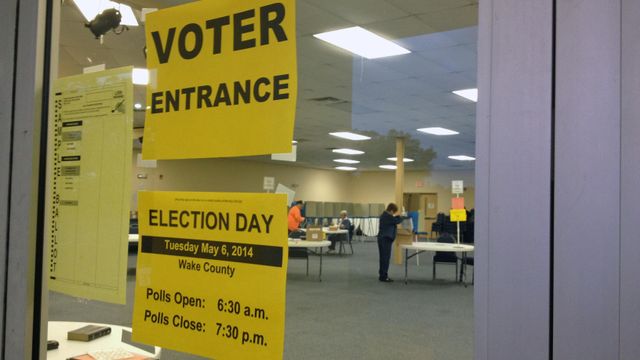Five questions today's primary will answer
Will big money beat the power of incumbency? Will Republicans avoid a U.S. Senate runoff? Is there really more interest in this election than four years ago? Voters will help answer these and others questions Tuesday.
Posted — UpdatedPrimaries in non-presidential years tend to be some of North Carolina's lowest-turnout partisan elections. Turnout barely exceeded 20 percent in 2002, when both Republicans and Democrats were holding competitive U.S. Senate primaries. This year, Sen. Kay Hagan, a Greensboro Democrat, is virtually assured of her party's nomination, although there is a bruising primary for the Republican nomination to challenge her.
Among the questions voters could help answer when they head to the polls are these five:
1) Will big money swing a normally sedate Supreme Court primary?
Normally, Hudson, an incumbent who has served in office for eight years, would enjoy an advantage in her three-way primary against Jeanette Doran and Eric Levinson. But only two candidates can emerge from the race, and it's possible the million-dollar campaign against her could keep Hudson from reaching the general election.
2) Is the tea party strong enough to force a runoff, or will the Republican establishment get its U.S. Senate candidate?
Polls in recent weeks indicate the question for Tillis is not whether he will take home the most votes in the eight-member primary field, but whether he will take home enough votes. Unless he gets 40 percent or more of the primary electorate, Tillis will face the very high likelihood that the second-place finisher will call for a runoff.
The most likely candidates for that second place spot are Rev. Mark Harris of Charlotte and Dr. Greg Brannon of Cary. Both Brannon and Harris hail from the more conservative tea party wing of the GOP, although Harris has more of a connection with social conservatives while Brannon fits more in the mold of the U.S. Sens. Mike Lee and Rand Paul.
3) Does stronger early voting turnout indicate a higher interest in the election or just a shift toward early voting?
The state Board of Elections has been trumpeting figures that show more North Carolinians voted early in-person this year than they did in 2010, the last non-presidential election year. Early voting concluded Saturday with 259,590 votes cast versus 172,972 votes cast during early voting four years ago. That means nearly 4 percent of eligible voters have already cast a ballot this year versus just under 3 percent in 2010.
Those numbers could indicate an increased interest in this year's election. Or it could just reflect a shift in habits as more voters take advantage of early voting.
4) Will an incumbent fall?
Incumbents generally enjoy advantages of name recognition and party loyalty when they ask voters for support. But several incumbents have faced strong challenges this year. Among the races to keep an eye on:
- 2nd Congressional District Republican primary: Congresswoman Renee Ellmers, once a tea party star, now faces a challenge from her conservative flank by Frank Roche, a radio talk show host.
- 3rd Congressional District Republican primary: Congressman Walter Jones Jr., long a brand name in eastern North Carolina politics, is fighting a three-way primary. One of his competitors, Taylor Griffin, has the backing of both one-time vice presidential nominee Sarah Palin and a deep-pocketed super PAC that has spent thousands to accuse Jones of being too liberal.
- State Senate District 15 Republican primary: Rep. Jim Fulgham isn't exactly an incumbent, but the state representative is Sen. Neal Hunt's hand-picked replacement. He is squaring off against Apryl Major.
- State House District 14 Republican primary: Rep. George Cleveland is being outspent by his GOP challenger, Bobby Mills, State Board of Elections reports show.
- State House District 27 Democratic primary: Rep. Michael Wray is attempting to fend of a challenge from Franklin Williams, a minister who has told local newspaper writers that the incumbent has not been aggressive enough in challenging GOP policies.
5) Will we be singing Clay's tune?
Clay Aiken rose to fame as a singer on "American Idol" and drew attention to the Democratic primary simply by throwing his hat into the ring.
Related Topics
• Credits
Copyright 2024 by Capitol Broadcasting Company. All rights reserved. This material may not be published, broadcast, rewritten or redistributed.






